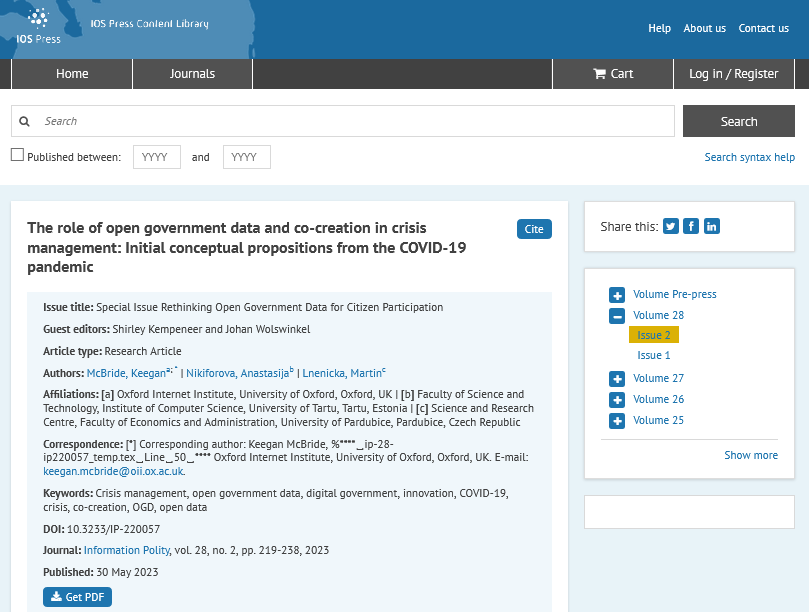
This time I am glad to announce that our paper The Role of Open Government Data and Co-Creation in Crisis Management: Initial Conceptual Propositions from the COVID-19 Pandemic developed together with Keegan McBride (Oxford University) and Martin Lnenicka (University of Pardubice) has been published and is finally waiting for you to read it!
Today, there is a growing body of research on the topic of open government data (OGD), which explore how OGD usage benefits, including but not limited to OGD ability to drive data-driven innovation and the development of new services. For example, research has shown that OGD can drive and enable new digital co-creation processes for digital public service development, which ultimately have the potential to create public value, and while there are numerous approaches to conceptualizing and understanding co-creation, in this paper, co-creation is understood as “a process through which two or more public and private actors solve a shared problem, challenge, or task through a constructive exchange of different kinds of knowledge, resources, competences, and ideas that enhance the production of public value”. Unfortunately, research that empirically examines the OGD-driven co-creation process is still rather limited, providing a need for research.
Our paper establishes an understanding into how OGD enables and drives the co-creation of new services and, in the process, creates public value within the context of a crisis – specifically the COVID-19 pandemic. The research started from an observation that in previous crises (such as floods and forest fires) OGD had seen use and that, during the COVID-19 pandemic, OGD was being released in large amounts and these data were being reused consistently. During the earliest stages of the pandemic some research was conducted that explored the adoption and implementation of data-driven innovations and services during the COVID-19 pandemic, but this research often focused only on new services, datasets released, or the potential value that has been created from these services. Research that explored the role that OGD specifically played in the crisis management process was missing.
While there are several different understandings of crisis – a political scandal or a natural disaster – this paper is concerned primarily with crises that have a potential to directly and negatively impact large number of individuals, i.e., natural disasters, conflict, or health related pandemics, epidemics, or endemics such as COVID-19. The common factors for these crises is a large divergence from normal operating conditions, risk to wellbeing, and the need manage them quickly and, often, with inadequate information. In such a situation, OGD may play an important role by aiding in the creation, collection, and dissemination of information, thus creating new opportunities for service co-creation and public value generation.
To generate new insight into how OGD was used during the COVID-19 pandemic as a crisis management tool a comparative exploratory case study was conducted, focusing on three Central and East European (CEE) countries: Czech Republic, Estonia, and Latvia, which are united by a shared history, traditionally lower levels of administrative capacity, and the relative newness of their public administrations. Within this context, technology is often embraced to subsidize missing capacities, unsurprisingly, many CEE countries are viewed as leaders when it comes to the use of digital technologies by the public sector. This provides an ideal context for exploring how OGD could be used during a crisis – states that are already used to using digital technologies in their administrations, often to overcome strategic shortages or skill gaps in their administrations, which may provide incentives for administrations to engage in co-creation. With the cases selected, two primary research questions were formulated and used to drive the study:
RQ1: What is the role of OGD in crisis management?
RQ2: How does OGD influence the co-creation of services that assist in crisis management?
In conducting the research to answer these questions, three clear contributions emerged.
💡 First, this paper provides new insight into the role that OGD may play during times of crisis and offers initial conceptual propositions about the role of OGD in the crisis management process.
💡 Second, new empirical exploration into how OGD drives the co-creation of new services is provided.
💡 Third, the paper demonstrates empirically the potential that OGD has when it is released and used.
Ultimately, this paper aims to be of use both to practitioners who may be directly involved in the management of a crisis or in the management of an OGD initiative, for academics interested in studying the impacts of OGD or crisis management, and also for citizens to see how they can play an active role in co-creation processes and thereby create value.
Sounds interesting? [hope so] if yes, find the paper here, while a pre-print (in case you cannot access the full-text) is available here.
McBride, K., Nikiforova, A., and Lnenicka, M. (2023) ‘The Role of Open Government Data and Co-Creation in Crisis Management: Initial Conceptual Propositions from the COVID-19 Pandemic’, Information Polity, vol. 28, no. 2, pp. 219-238, 2023, Q1 (Communication, Geography, Planning and Devlpment, Sociology and Political Science), IF: 2.784, CiteScore: 4.4